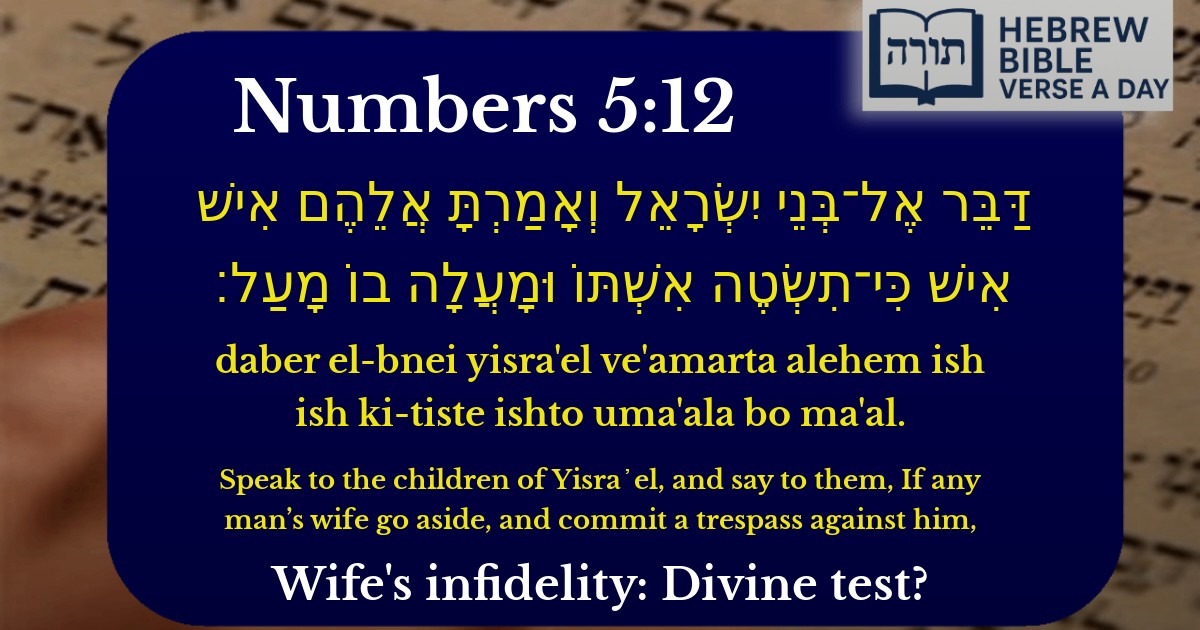Join Our Newsletter To Be Informed When New Videos Are Posted
Join the thousands of fellow Studends who rely on our videos to learn how to read the bible in Hebrew for free!
Hebrew Text
דַּבֵּר אֶל־בְּנֵי יִשְׂרָאֵל וְאָמַרְתָּ אֲלֵהֶם אִישׁ אִישׁ כִּי־תִשְׂטֶה אִשְׁתּוֹ וּמָעֲלָה בוֹ מָעַל׃
English Translation
Speak to the children of Yisra᾽el, and say to them, If any man’s wife go aside, and commit a trespass against him,
Transliteration
Daber el-bnei yisra'el ve'amarta alehem ish ish ki-tiste ishto uma'ala bo ma'al.
Hebrew Leining Text
דַּבֵּר֙ אֶל־בְּנֵ֣י יִשְׂרָאֵ֔ל וְאָמַרְתָּ֖ אֲלֵהֶ֑ם אִ֥ישׁ אִישׁ֙ כִּֽי־תִשְׂטֶ֣ה אִשְׁתּ֔וֹ וּמָעֲלָ֥ה ב֖וֹ מָֽעַל׃
דַּבֵּר֙ אֶל־בְּנֵ֣י יִשְׂרָאֵ֔ל וְאָמַרְתָּ֖ אֲלֵהֶ֑ם אִ֥ישׁ אִישׁ֙ כִּֽי־תִשְׂטֶ֣ה אִשְׁתּ֔וֹ וּמָעֲלָ֥ה ב֖וֹ מָֽעַל׃
🎵 Listen to leining
Parasha Commentary
📚 Talmud Citations
This verse is quoted in the Talmud.
📖 Sotah 2a
The verse is discussed in the context of the laws concerning a wife suspected of adultery (Sotah). The Talmud explores the implications and procedures related to this biblical commandment.
📖 Nedarim 90b
Referenced in a discussion about vows and the consequences of marital strife, linking back to the biblical concept of a wife 'going aside'.


Context of the Verse
The verse (Numbers 5:12) introduces the laws of the sotah, a woman suspected of marital infidelity (ishah ha-sotah). This section outlines the procedure for addressing suspicions of adultery when there are no witnesses, as detailed in the following verses (Numbers 5:11-31). The Torah provides a unique ritual to resolve such cases, emphasizing Divine intervention to reveal the truth.
Key Terms and Their Meanings
Halachic and Moral Implications
The sotah procedure is unique in Jewish law, as it relies on a miraculous revelation of guilt or innocence through the "bitter waters" (mei ha-marim). The Talmud (Sotah 2a) teaches that this ordeal was only applicable when the husband himself was free from sin in marital matters, underscoring the importance of mutual fidelity.
Maimonides (Rambam) in Hilchot Sotah (1:1-3) elaborates on the conditions under which the sotah ritual is invoked, emphasizing that it was a deterrent against hidden sin and a means to restore peace in the household.
Midrashic Insights
The Midrash (Bamidbar Rabbah 9:9) connects this passage to the broader theme of faithfulness—both in marriage and in the relationship between Bnei Yisrael and Hashem. Just as a wife must be faithful to her husband, so too must the Jewish people remain loyal to the covenant with G-d.
Modern Orthodox Perspective
While the sotah ritual is not practiced today (as the Talmud explains it ceased with the destruction of the Temple), its lessons remain relevant. It teaches the severity of zenut (forbidden relationships) and the importance of trust, repentance, and Divine justice in marital relationships.